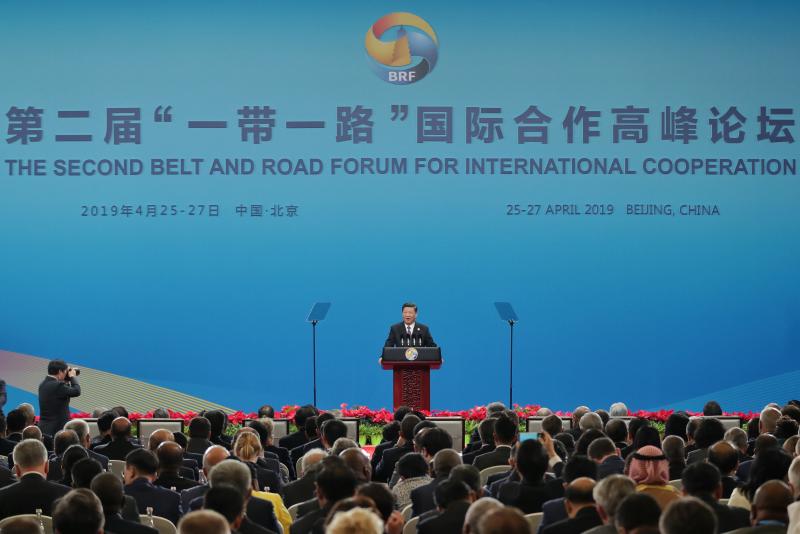China will keep Belt and Road sustainable, clean and green: Xi Jinping
Sign up now: Get insights on Asia's fast-moving developments

Chinese President Xi Jinping attempted to soothe fears over the Belt and Road project in a half-hour speech.
ST PHOTO: KEVIN LIM
BEIJING - Chinese President Xi Jinping has pledged to make his outward-looking Belt and Road mega project clean, green and financially sustainable even as the country continues with its task of housekeeping to welcome more foreign investors.
In a half-hour speech on Friday (April 26) aimed as much at the recipient countries of his Belt and Road campaign as it is at the United States and other developed nations, President Xi attempted to soothe fears over the project. He also appeared to tacitly acknowledge the criticisms levelled both at his his signature diplomatic policy as well as the country's handling of foreign businesses.
He was speaking to dozens of world leaders and as many as 5,000 representatives from 150 countries who have gathered for a three-day summit on the Belt and Road Initiative, a grand vision President Xi first spoke of in 2013 to link Asia to Europe and Africa through a network of roads, railway lines and ports.
China has invested US$90 billion (S$122 billion) in various infrastructure projects while banks have given out more than US$300 billion in loans, according to the latest figures from the Chinese authorities.
But the East Asian giant has come under fire for funding polluting projects such as coal plants and lacking transparency in its deals.
"We must adhere to the concept of openness, greenness, and cleanliness," said President Xi at the China National Convention Centre on Friday. "Operate in the sun and fight corruption together with zero tolerance."
He also vowed to adopt international rules and standards, including greater accountability in the procurement, tendering and bidding of projects.
Controversy has dogged the Belt and Road after a string of troubled projects hit the headlines and raised alarm bells over how China was plunging poor countries into unsustainable debt.
Government ministers had, on the first day of the summit on Thursday, signalled a change of tack in the country's approach to the campaign. Finance Minister Liu Kun released an analysis framework aimed at helping countries manage debt, while other officials and state-owned enterprises promised to do better with green development and local participation.
In his speech, President Xi also spent time outlining how the country intends to open its door wider to foreign investments.
He said China will allow more wholly-owned foreign businesses to set up in more sectors, and will speed up implementing a foreign investment law passed by Parliament in March.
In a nod to nagging complaints ahead of another round of trade talks in Beijing next week, President Xi also promised to beef up enforcement of intellectual property infringement, put a stop to forced technology transfer and abolish "unreasonable regulations, subsidies and practices that impede fair competition and distort the market".
"We do not deliberately pursue a trade surplus and are willing to import more competitive, high-quality agricultural products, manufactured goods and services to promote balanced trade development," he said, adding that China will lower and remove non-barrier tariffs.
US Trade Representative Robert Lighthizer and Treasury Secretary Steven Mnuchin are scheduled to return for another round of trade negotiations that the US says will focus on intellectual property, forced technology transfer, non-tariff barriers, agriculture, services, purchases, and enforcement.
Vice-Premier Liu He is subsequently visiting Washington for additional talks on May 8.
Despite his assurances, President Xi on Friday also took a veiled dig at the US over its actions against telecom-maker Huawei and treatment of Chinese students and scholars after reports surfaced that that the American authorities were delaying their visa applications or denying them. China has reportedly also been doing the same to American academics.
"We hope other countries will also create an enabling environment of investment, treat Chinese enterprises, international students and scholars equally, and provide a fair and friendly environment for their normal international exchanges and cooperation activities."
The yuan rose after President Xi's speech, on the promise that China will keep its currency stable.


